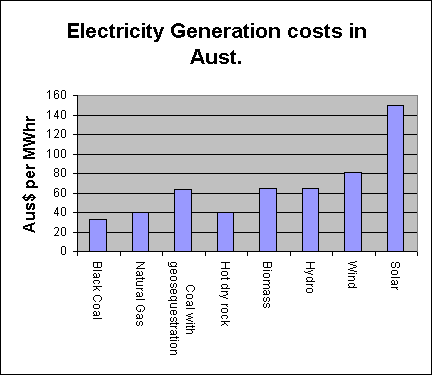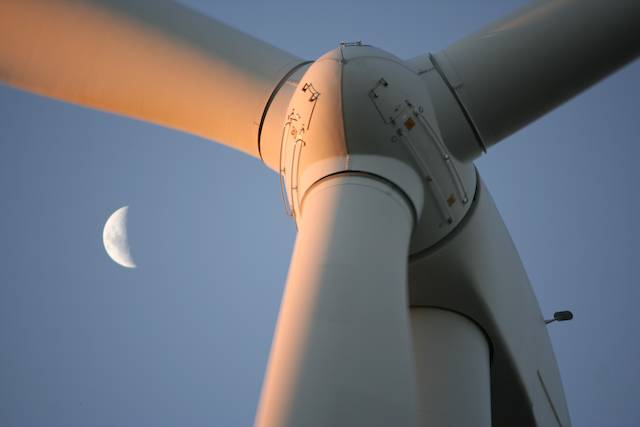Introduction
|
Both the Howard and the Rudd governments have refused to place a tax on carbon because they say that to do so would damage Australia's economy by adversely affecting the coal industry. It could equally well, and justifiably, be argued that taxing anything damages Australia's economy; but taxes have to be raised, and are raised, to run public services and build state infrastructure.
|
An across-the-board tax on carbon fuels, either when they are mined or when they are imported, would be far simpler to administer than the proposed carbon trading scheme, and adjusting the amount of the tax to produced the desired level of greenhouse gas production would also be simpler. In the case of coal that is exported, the tax could be refunded when the coal left the country, so long as it was going to a nation that had an effective greenhouse emissions reduction scheme in place.
The fact that our governments refuse to tax carbon is further proof, if any were needed, that they are not serious about tackling climate change, and an indication of the power that the coal industry has over Australian Governments.
One of the biggest problems with a carbon trading scheme is that it involves the handing out of 'permits to pollute'. If, as is almost certain, the original target is found to be too low, governments will have to compensate the polluting industries for the cancellation of their permits. The great advantage to a tax is that it can start relatively small and then be increased as and when needed.
|
|
|
A tax on pollution
In Australia industry is allowed to dump waste carbon dioxide into the atmosphere, adding to the enhanced greenhouse effect and climate change. Very few countries allow their industries to dump wastes into rivers or lakes or onto the land without limits, safeguards, and remedial action, why should dumping waste into the atmosphere be any more acceptable. See Fossil fuel electricity in perspective and No level playing field.A bill proposing a carbon tax was brought before the Australian Parliament some years ago, but was defeated. It appears that the fossil fuel lobby is stronger than the Government's will to reduce greenhouse.
Prime Minister Howard refuses to impose a carbon tax. Among other things he claims that it would cause the fuel prices to rise and increase the cost of electricity. This is something between a half-truth and an outright lie and he says it to make a carbon tax unpalatable to the voters. PM Rudd has hardly mentioned a carbon tax.
Governments impose taxes. Most taxes are simply a way of raising money. If a carbon tax was imposed, other taxes could be reduced in proportion: it could be revenue-neutral. Some of the existing excise on petrol and diesel could be removed to keep motor fuel prices from rising excessively. A carbon tax on coal destined to be burned will increase the price of electricity, but income tax, GST, or other taxes could be reduced so that the cost of living, and the total tax take, would remain the same.
While the Howard Government has refused to countenance a tax on carbon, it has imposed a tax on biodiesel. A new company, the Australian Biodiesel Group, cited a new tax on biodiesel as one of the main reasons for its poor financial performance in 2006. Greenhouse neutral biofuels should be encouraged, not taxed, if Australia is to reduce its greenhouse gas production rates.
Also see Greener coal, which discusses ways
of reducing carbon dioxide emissions from the coal industries and increasing
the efficiency of coal-fired power stations, etc.
Export coal
Coal is Australia's largest single export commodity. The tax collected on coal mined in Australia could possibly be credited to those countries that import Australian coal, so long as those countries had credible greenhouse reduction strategies in place.Making the condition that a nation that imports Australian coal must be facing-up to it's own greenhouse responsibilities before refunding the tax, or some part of the tax, would help reduce consumption without necessarily entirely killing off the coal exporting industry (although ending coal mining all together would be the ultimate aim).
It is tempting to suggest that Australia should stop mining and exporting coal all together, but I fear this is unrealistic and dangerous. (The USA, for example, has demonstrated that it is willing to invade other countries in order to ensure its energy supplies.)
|
|

|
Cost of electricity generated by various methods, including capital costsAdapted from Geodynamics Annual Report 2004 - Note that wind-generated electricity is not greatly more expensive than the estimated cost of 'responsible' coal-fired power (Coal with geosequestration). Note also that coal-fired power with geosequestration of carbon dioxide has never been proven at any price. Solar here, I believe, refers to photo-voltaic. |
|
How much tax?
How much would the electricity price rise?
To make renewable electricity generation competitive with fossil fuel fired generation we would need about $40 tax per tonne of carbon; this would increase the wholesale cost of electricity by about $40 per megawatt hour (MWh).The graph at right shows comparative electricity generation costs at present. A $40/t carbon tax would raise the cost of coal generated power from about $35/MWh to about $75/MWh.
At present most domestic electricity is sold for around 16 cents per
kilowatt hour (kWh).
A $40/t tax would increase the wholesale and retail prices of fossil
fuelled electricity by about 4 cents per kWh.
In South Australia at least, the supply charge is a substantial part of
all power bills; there would be no need for this to increase with the
introduction of a carbon tax.
Supposing that the supply charge (and GST on the supply charge) makes up
about a third of your electricity bill, you could expect your bill to
increase by about 17%.
As mentioned earlier, this could be offset by tax reductions elsewhere.
Motor fuels
Motor fuels are already highly taxed. (It's odd, isn't it, governments see no problems in placing very high taxes on motor fuels, but somehow see coal as sacred and untaxable?)Should this be changed? I'd like to see the rate of tax on motor fuels increased because I believe that the climate change problem is so serious that we must attack it from all possible angles.
